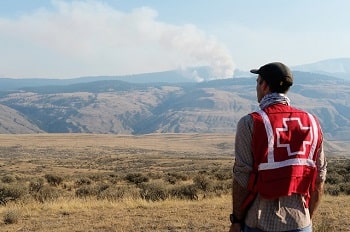By Hannah Blanton, Canadian Red Cross Digital Volunteer

When it comes to wildfires, it can be easy to assume “it’ll never happen to me.” And while it’s true that emergencies are by nature unexpected, that doesn’t mean you can’t be prepared to face them head on if and when they do occur.
Canada experiences around 8,000 wildfires every year. These can quickly devastate large areas of forest, grasslands, buildings, and even entire communities. As
wildfire season rolls around again, we’ve put together some tips to help you prepare - all from the comfort of your own home.
Stay in the know
The most important thing you can do in case of a wildfire is to stay informed. Wildfires can throw burning debris up to two kilometres, and sparks and embers can ignite material outside the main fire area. It is therefore important to stay alert and informed even if the fire is still far away from your home.
Have an emergency plan and practice it
It is also vital to have an
emergency plan in place so that you can evacuate at short notice. This can include everything from planning evacuation routes to protecting your home and stocking up on supplies. You may be surprised at just how much you can prepare in advance:
- Establish multiple evacuation routes—for your house, workplace, children's schools, and community. Practice these often.
- Pack an emergency kit.
- Make sure everyone in your house knows the location of fire extinguishers, utilities, your emergency kit, and your meeting point.
- Keep your vehicle fuelled.
- Visit FireSmart Canada and conduct the assessment for tips on how to protect your home.
- Designate an out-of-town contact you can stay with or communicate with during an emergency, and ensure everyone has their contact details.
- If you can’t evacuate, stock up on at least three days’ supply of food, water, and other essentials.
One final word on evacuations: make sure you know the difference between an
Evacuation Order and an
Evacuation Alert. An Evacuation Order means you are at risk and should evacuate the area immediately. An Evacuation Alert means you should be ready to leave on short notice (which you will be if you have a good emergency plan in place!).
Self-care in a wildfire emergency
So, you have your information sources bookmarked, your emergency plan set, your emergency kit ready to grab, and your vehicle and house stocked with essential supplies. You're almost there! There's one final thing you may have overlooked in your preparations:
how to prepare emotionally for a disaster.
Disasters and emergencies cause significant stress and disrupt our regular routines. A
self-care plan can help you anticipate, monitor, and understand your reactions during and after a wildfire or other emergency.
Related stories: